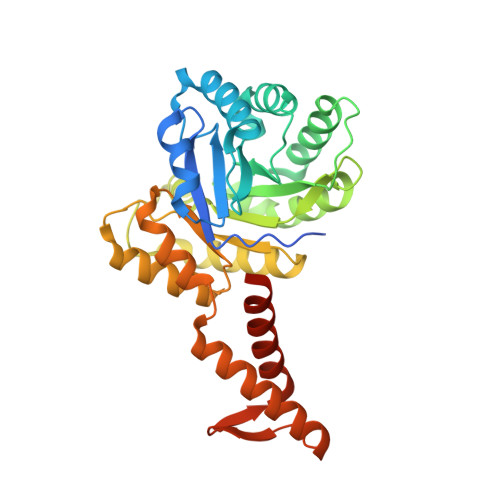The Human Knockout Gene CLYBL Connects Itaconate to Vitamin B12.
Shen, H., Campanello, G.C., Flicker, D., Grabarek, Z., Hu, J., Luo, C., Banerjee, R., Mootha, V.K.(2017) Cell 171: 771-782.e11
- PubMed: 29056341
- DOI: https://doi.org/10.1016/j.cell.2017.09.051
- Primary Citation of Related Structures:
5VXC, 5VXO, 5VXS - PubMed Abstract:
CLYBL encodes a ubiquitously expressed mitochondrial enzyme, conserved across all vertebrates, whose cellular activity and pathway assignment are unknown. Its homozygous loss is tolerated in seemingly healthy individuals, with reduced circulating B 12 levels being the only and consistent phenotype reported to date. Here, by combining enzymology, structural biology, and activity-based metabolomics, we report that CLYBL operates as a citramalyl-CoA lyase in mammalian cells. Cells lacking CLYBL accumulate citramalyl-CoA, an intermediate in the C5-dicarboxylate metabolic pathway that includes itaconate, a recently identified human anti-microbial metabolite and immunomodulator. We report that CLYBL loss leads to a cell-autonomous defect in the mitochondrial B 12 metabolism and that itaconyl-CoA is a cofactor-inactivating, substrate-analog inhibitor of the mitochondrial B 12 -dependent methylmalonyl-CoA mutase (MUT). Our work de-orphans the function of human CLYBL and reveals that a consequence of exposure to the immunomodulatory metabolite itaconate is B 12 inactivation.
Organizational Affiliation:
Howard Hughes Medical Institute and Department of Molecular Biology, Massachusetts General Hospital, Boston, MA 02114, USA; Department of Systems Biology, Harvard Medical School, Boston, MA 02115, USA; Broad Institute, Cambridge, MA 02141, USA.




















